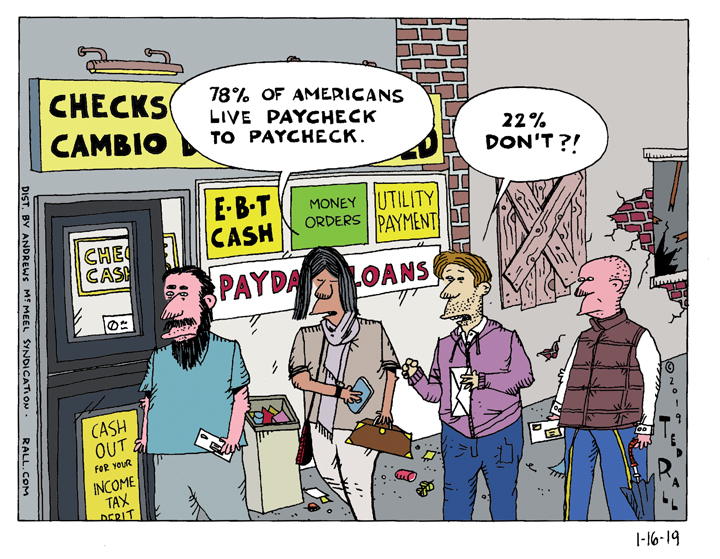78% of Americans live paycheck to paycheck. The United States isn’t a superpower. It is, as President Trump would say, a “shithole country.”
How Do the Other 22% Live?

Ted Rall
Ted Rall is a syndicated political cartoonist for Andrews McMeel Syndication and WhoWhatWhy.org and Counterpoint. He is a contributor to Centerclip and co-host of "The TMI Show" talk show. He is a graphic novelist and author of many books of art and prose, and an occasional war correspondent. He is, recently, the author of the graphic novel "2024: Revisited."

11 Comments. Leave new
I suspect that many of the 22% simply don’t admit they’re living paycheck-to-paycheck.
The real metric? How many people have high confidence they could find a new job, after being let go without notice, before running out of available funds. Everytime I get laid off, I end up going through all my savings and further into debt. Then I get to start clawing my way back out of the hole.
FDR saved monopoly capitalism by presenting its practitioners with two options: Would you like LESSER share of SOMETHING, or 100% of NOTHING?—the latter of which was tantamount to the consequences of a then plausible revolution against them.
Today’s billionaire capitalists now make the same offer to wage laborers: Would you like a LESSER share of the wealth created by your labor, or 100% of NOTHING—the latter of which is tantamount to the termination of the wage laborer’s employment.
It seems that what now goes under the name of “civilization”, for all of its self-praise, has yet to come up with a more effective negotiating tactic than the confrontation between adversaries both willing and able to engage in a Your-Money-or-Your-Life styled negotiation.
I sincerely hope to be proven wrong.
Employment under Bill Clinton’s administration became precarious, leading to the lesser demands of labor. And if a little precarity was good, then more must be better, (But for whom?) thus leading economists to the belief that the end of business cycles had arrived at last.
And this has proven to be wrong.
“Paycheck”?
[…] country on earth” live paycheck to paycheck, with no real savings. As Ted Rall notes, barely keeping his sense of humor. He […]
Right and wrong, Ted. Perhaps a «shithole country» for a large number of its inhabitants, but at the same time certainly a «superpower» in its ability to destroy things, both at home – and not least – abroad….
Henri
PS : Are employees in the US stilled paid mainly by cheque ?…
My experience is that payment is now through direct deposit for most, at least beyond retail.
Thanks, Alex – that’s what I should have thought, but your is a strange country….
Henri
your → yours. Damn, first typo I’ve missed since Ted provided us with 10 minutes to reflect and reconsider. Hope its’ not a prologue to the omen coming on….
Henri
The 78% may be an overestimate, then again, as CH pointed out, it does not reflect those who do not draw a paycheck, nor those who are caught in perpetual debt (so are actually several paychecks behind).
Interestingly, immediately spending – rather than hoarding/investing – whatever available funds can be regarded as a practical indicator of class (consciousness or habits): working class people tend to spend immediately whereas the traditional approach of the (petite) bourgeoisie is save up and invest long-term in education, home-ownership, small shops, etc.
While constantly maligned as spend-thrifts with poor impulse control, people who live paycheck to paycheck often have street smarts: what little money can be hoarded at punitive effort may lose its value overnight from wall street shenanigans, higher education is harder to attain and less likely to lead to a lucrative job in the absence of the right accent and cultural style, skin color, connections, etc. Conversely, security comes less from hoarded money and abstract prestige but from a network of friends who help out in a pinch with their time (not money, because they don’t have any, either).
US mass culture used to be particularly effective at inculcating a puritan, capitalist cultural set in individuals reading Ayn Rand while feverishly pulling at their bootstraps; maybe this is in shambles now that the home-ownership drive successfully siphoned most of people’s wealth into the hands of scammers and banksters. Maybe people now only aim to participate in capitalism as consumers, not proto-capitalists.
> working class people tend to spend immediately
I’ve recently been reading a Millennial who grew up poor. One of the things he talks about is how it teaches you exactly that: on those rare occasions when you get money, you tend to spend it immediately ‘cuz you don’t expect to get the opportunity again any time soon (if at all.)
He also notes that this doesn’t help one transition out of poverty.
Many Working Class people today don’t have the option of saving, ‘cuz paycheck to paycheck. Many who could, don’t – how come money management isn’t one of those skills taught in High School?
“Budgeting and Economics” was one chapter in Home Ec. (back when it was taught ) But that was aimed more at kitchen and shopping than long-term goals, and of course didn’t include boys.
Jack London beat him by 100 years 😉
In Martin Eden he semi-autobiographically describes a young proletarian aspiring writer who falls in love with a upper-middle class girl. To marry, he needs to secure corresponding cultural and financial capital. He tells her that some crazy second-degree uncle managed to do so by secluding himself in a tiny room for decades writing while living off steamed grain porridge. She is in favor of such a business-model, he has a premonition that not too much will be left of a man after such an ordeal…
Somewhat depressing read, best paired with his journalism/sociological study The people of the Abyss for maximum punch…